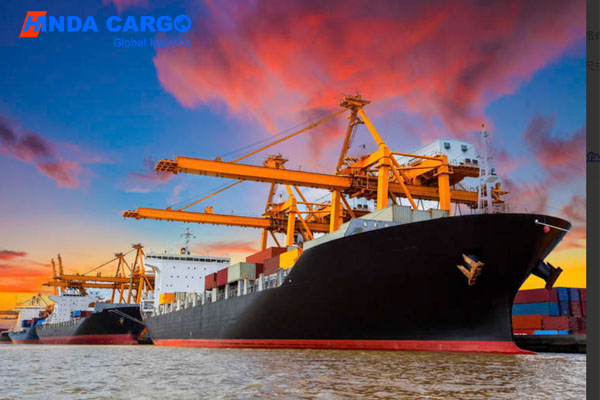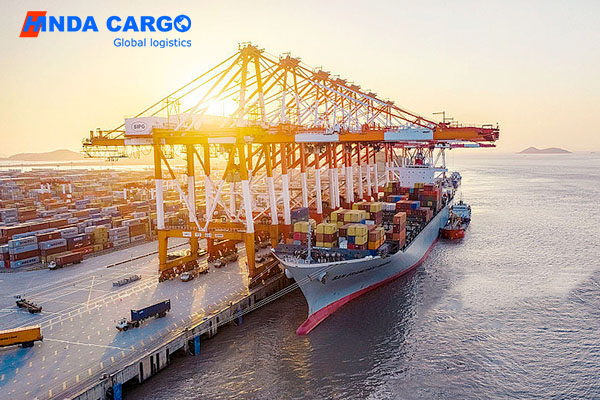What is the difference between freight shipping and cargo ships?
In today's globalized world, international trade is booming, and freight shipping and cargo ships play a vital role in it. Although the two are often confused, they have obvious differences in concept and function.
Understanding these differences is crucial for businesses and consumers, and helps to better choose and utilize logistics services. This article will analyze the differences between freight shipping and cargo ships in detail, and explore their different roles and importance in international logistics.

What is freight shipping?
Definition and role of freight shipping:
Freight shipping (Freight) refers to the transportation process of goods, including the entire logistics link from the place of shipment to the place of receipt. Freight shipping covers a variety of modes of transportation, such as ocean freight, air freight, land transportation and multimodal transportation. Freight shipping not only involves the actual transportation of goods, but also includes related services such as customs clearance, warehousing, packaging and distribution.
The main components of freight shipping:
1. Mode of transportation: Freight shipping can be carried out by ocean freight, air freight, land transportation and rail transportation. Each mode has its advantages and applicable scenarios, such as ocean freight is suitable for long-distance transportation of bulk goods, and air freight is suitable for high-value goods that need to be delivered urgently.
2. Customs clearance service: Freight shipping involves complex customs procedures, including customs declaration, tax payment and inspection. Freight shipping companies usually provide professional customs clearance services to ensure smooth customs clearance of goods.
3. Warehousing and distribution: Freight shipping companies usually provide warehousing and distribution services to meet the various needs of customers. This includes temporary storage, order fulfillment and last-mile delivery.
4. Packaging and labeling: In order to ensure the safety of goods during transportation, freight shipping companies provide professional packaging and labeling services. This includes the use of appropriate packaging materials and methods, as well as correct cargo labels for identification and handling.
5. Logistics management and tracking: Modern freight shipping relies on advanced logistics management systems to improve transportation efficiency and transparency through real-time tracking and information sharing.
What is the importance of freight shipping?
Freight shipping plays a vital role in the global supply chain. The following are several key roles of freight shipping in international logistics:
1. Reduce transportation costs: By optimizing transportation routes and methods, freight shipping companies can help customers reduce logistics costs and improve competitiveness.
2. Improve transportation efficiency: Freight shipping companies provide one-stop services to simplify logistics processes, improve transportation efficiency, and ensure that goods arrive on time.
3. Ensure the safety of goods: Professional packaging, labeling and insurance services can reduce the risk of damage and loss of goods during transportation.
4. Deal with complex regulations: Freight shipping companies are familiar with the customs regulations and trade policies of various countries and can help customers deal with complex customs clearance procedures to avoid unnecessary delays and fines.

What is a cargo ship?
Definition and role of cargo ships:
Cargo ships are ships specially used to transport goods. Cargo ships are the main tool of ocean freight and undertake most of the global cargo transportation tasks. Depending on the different goods transported, cargo ships can be divided into many types, such as container ships, bulk carriers, tankers and ro-ro ships.
Main types of cargo ships:
1. Container ships: ships used to transport standard containers. Container ships are an important tool for modern ocean freight because they can load and unload goods efficiently.
2. Bulk carriers: used to transport bulk cargoes such as coal, ore and grain. Bulk carriers do not have a fixed cargo hold layout and can be adjusted according to the type of cargo.
3. Tankers: used to transport liquid cargoes such as crude oil and refined oil. Tankers are equipped with special storage tanks and safety equipment to ensure the safe transportation of liquid cargoes.
4. Ro-ro ships: used to transport rolling cargoes such as vehicles and mechanical equipment. Ro-ro ships are equipped with special loading and unloading equipment to facilitate the loading and unloading of cargoes.
What is the importance of cargo ships?
Cargo ships are of great significance in global trade and economic development. The following are several key roles of cargo ships in international logistics:
1. Large-scale transportation: Cargo ships are able to transport bulk cargoes to meet the needs of the global market. For example, a large container ship can transport thousands of standard containers at a time, greatly improving transportation efficiency.
2. Cost-effectiveness: Ocean freight is usually the most economical way to transport large quantities of cargo over long distances. The relatively low operating costs of cargo ships can significantly reduce the cost of cargo transportation.
3. Global coverage: Cargo ships can reach ports around the world, connect global supply chains, and promote the development of international trade.
4. Flexibility: Different types of cargo ships can meet various cargo transportation needs, from liquid cargo to heavy machinery and equipment, cargo ships can provide suitable transportation solutions.
What is the difference between freight shipping and cargo ships?
1. Conceptual difference
Freight shipping is a broad concept that covers all aspects and services of cargo transportation. Cargo ships are specific means of transportation and are part of freight shipping, mainly responsible for maritime transportation.
2. Functional difference
The functions of freight shipping companies include a series of services such as transportation arrangements, customs clearance, warehousing, distribution, packaging and labeling, providing one-stop logistics solutions. The function of cargo ships is mainly actual cargo transportation, especially maritime transportation, responsible for transporting goods from one port to another.
3. Difference in service scope
The service scope of freight shipping companies is wider, involving multiple modes of transportation and logistics links, and can provide comprehensive logistics solutions. The service scope of cargo ships is relatively specific, mainly focusing on sea transportation. Although there are different types of cargo ships, their services are still limited to the field of ocean freight.
4. Differences in customer groups
The customer groups of freight shipping companies include various types of companies and individuals who need to transport goods internationally, such as manufacturers, wholesalers, retailers and e-commerce companies. The customer groups of cargo ships are mainly freight shipping companies and large trading companies. These customers complete sea transportation tasks by leasing or purchasing ship services.
5. Differences in technology and management
Freight shipping companies rely on advanced logistics management systems and technologies, such as big data, the Internet of Things and artificial intelligence, to achieve digital and intelligent management of the transportation process. Cargo ships rely on ship design and technical equipment, such as ship engines, navigation systems and safety equipment, to ensure the safety and efficiency of sea transportation.

Case analysis
In order to better understand the difference between freight shipping and cargo ships, we can analyze it through actual cases.
Case 1: Transnational electronic product transportation
A Chinese electronic product manufacturer needs to transport a batch of new mobile phones to the US market. The manufacturer selected a freight shipping agency that provided a one-stop logistics solution, including air freight, customs clearance, warehousing and distribution services. The freight shipping company arranged the air freight from China to the United States and was responsible for all customs clearance procedures. After the goods arrived in the United States, the freight shipping company also provided warehousing and last-mile distribution services to ensure that the goods were delivered to major retailers in a timely manner.
Case 2: Ocean freight for large machinery and equipment
A German engineering company needed to transport a batch of large machinery and equipment to India. Due to the large size and heavy weight of the goods, ocean freight was chosen. The engineering company leased a bulk carrier through a freight shipping agency. The freight shipping agency was responsible for coordinating transportation arrangements, including loading, sea transportation and unloading. The bulk carrier departed from the German port and arrived safely at the Indian port after several weeks of sailing. The freight shipping agency also assisted in customs clearance procedures to ensure the smooth entry of the goods.
Conclusion
Freight shipping and cargo ships play different but equally important roles in international logistics. Freight shipping, as a broad concept, covers multiple links from transportation arrangement to customs clearance, warehousing, distribution, etc., providing a one-stop logistics solution. As a specific means of transportation, cargo ships are mainly responsible for sea transportation and are an important part of the freight shipping process.
Understanding the difference between freight shipping and cargo ships will help companies and consumers better choose and use logistics services and improve the efficiency and security of international trade.




